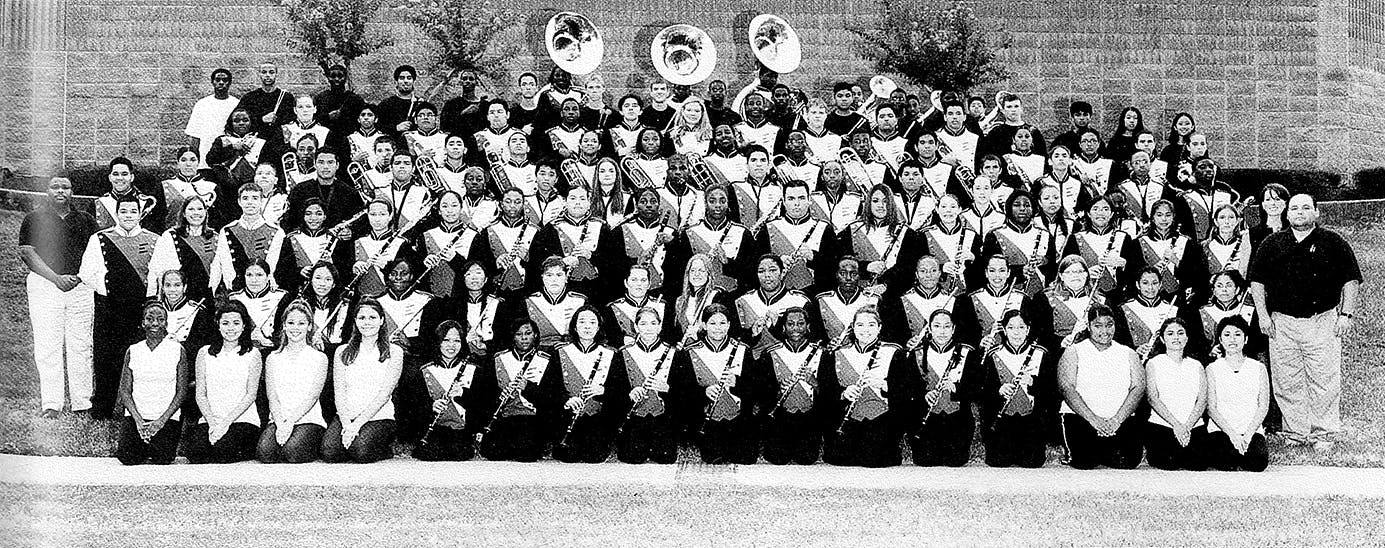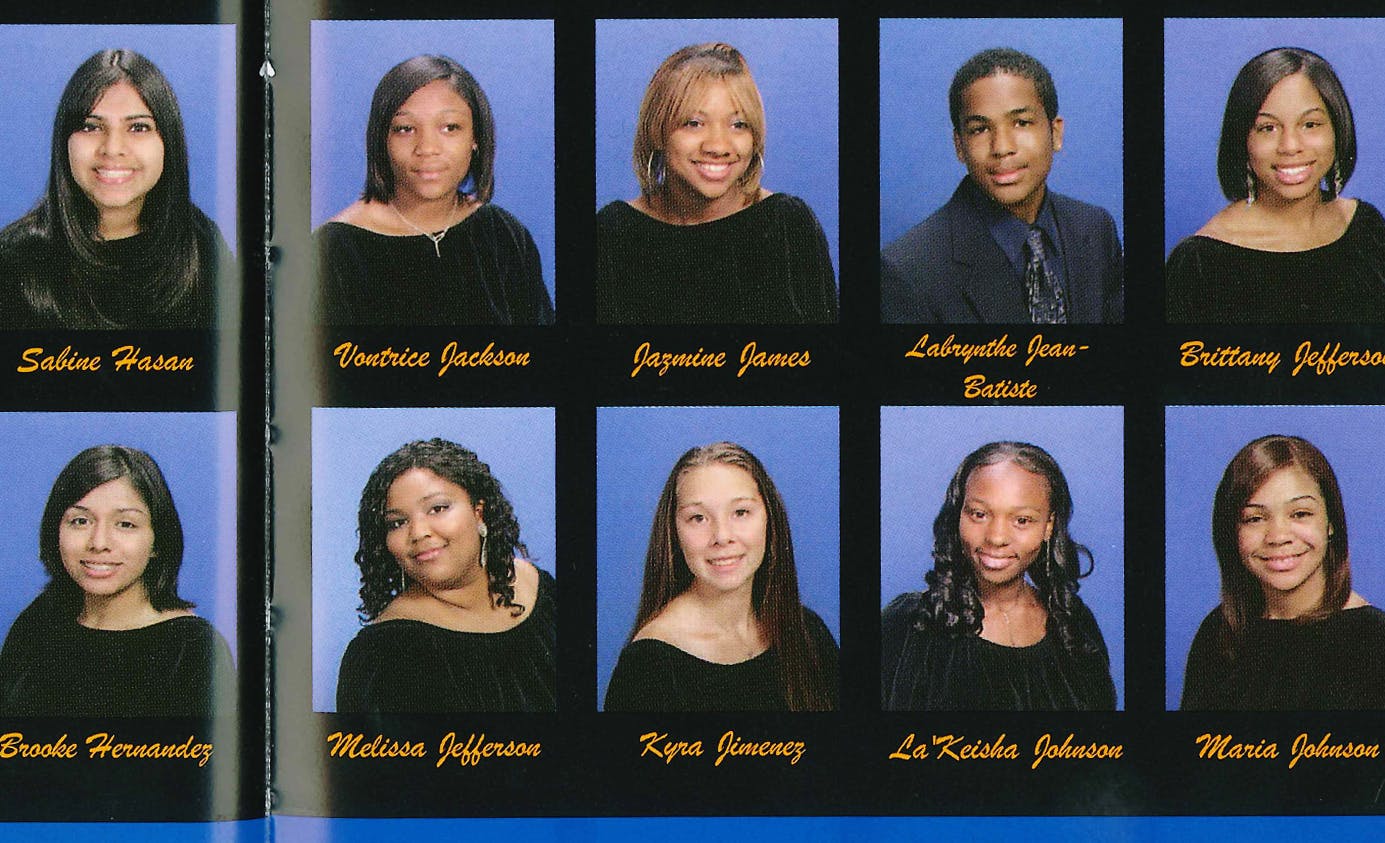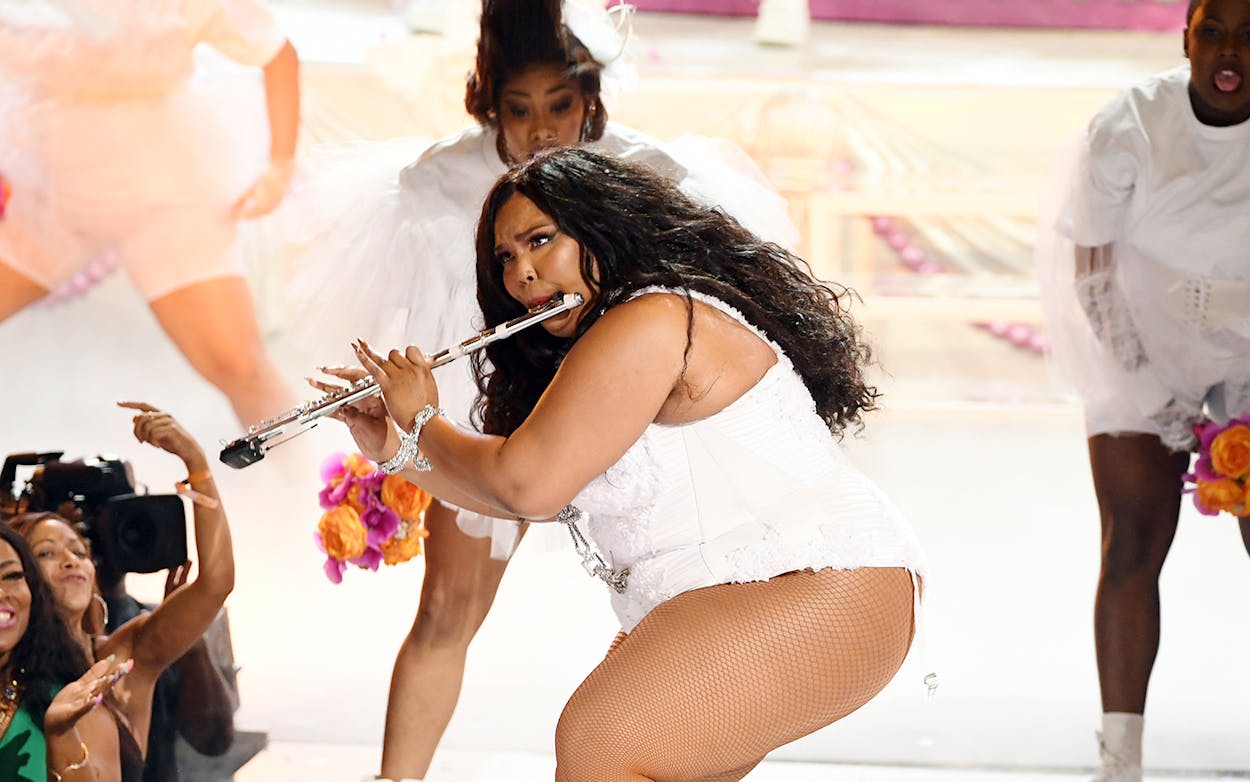I have never seen a shooting star. Whether I blinked at the wrong time or just took too long to glance up, I’ve missed them every time. But last month, pressed against thousands of people in 99-degree heat at the Austin City Limits Music Festival, I witnessed the moment a star was born.
When I first heard Lizzo perform live—earlier this year at a packed 12:30 a.m. set at Stubb’s during South by Southwest—her song “Juice” was a verified radio bop, and her loyal fan base of “Lizzbians” grew steadily every day. Lizzo was an unapologetic, flute-wielding former band kid turned star, clearly headed straight toward Earth in a fiery blaze.
Things happened quickly after that: Her first charting album, Because I Love You, debuted at number six on the Billboard 200 upon its April release. Over the summer, a meme that made the rounds online ensured that no one would ever think about DNA tests the same way again. Lizzo’s flute, Sasha, got its own Instagram account, and has since inspired its own Halloween costumes and received a coveted blue checkmark. And when early October rolled around, Lizzo had long outgrown the ACL side-stage slot that had been set in stone months before.
Cheered on by the mass of about 60,000 fans before her during ACL’s first weekend, Lizzo took the stage and made it her church. From her pulpit, Lizzo delivered a lyrical sermon on self-love and confidence. Toward the end of the set, her call to have everyone take out their phones bathed the festival in light. Even in a sea of people, the whole thing felt intimate.
The fact that Lizzo’s largest-ever crowd came out for her in the state that raised her felt like a full-circle moment. Just three years ago, her previous performance at the festival was one of the earliest slots in the day. Newcomers buried in the bottom half of the festival lineup rarely return with as much force, let alone as much mainstream success as Lizzo. And though the magnitude of the crowd had changed, she hadn’t.

Manny Gonzalez can still remember the song that Lizzo auditioned with for high school marching band tryouts in 2003. The soon-to-be freshman chose “The Carnival of Venice”—a playful, intricate flute melody arranged by the Italian flutist Giulio Briccialdi. “All I wrote down in my notes was ‘wow,’” Gonzalez says. For the next four years at Alief Elsik High School in Houston, Melissa Jefferson was a musical standout—she was always first-chair flute, and regularly placed in one of the top chairs at regional band competitions. (Jefferson’s nickname, “Lizzo,” came from her persona in her teenage rap trio Cornrow Clique).
By the time she graduated from high school, she had pivoted toward studying the flute with the hope of performing in an orchestra. Gonzalez had helped Lizzo secure a scholarship at the University of Houston, but her love of rap, flute, and songwriting felt increasingly at odds with her classical music major. “I basically had to choose between flute or this other lifestyle that I was chasing,” Lizzo told CBS News.
During Lizzo’s junior year of college, her father’s health declined. Struggling with that and her identity crisis about what kind of music she wanted to pursue, she dropped out of school. After spending time sleeping in her car or on the floor at friend’s houses, she withdrew from life in Houston and spent time with her mom in Aurora, Colorado. There, she started developing a new passion: singing.
After taking a few months to practice her vocals in her room or around the house, she returned to Houston in 2008 with renewed creative energy. She started joining rock and indie bands around town, including what she called her “first real band,” Ellypseas, with a newfound confidence in her craft. But when her father died in 2010, her progress slowed. “When he passed away, I got really depressed and I quit music,” she said in an interview with Trevor Noah. “I was like, ‘I have no reason to do this anymore,’ because I was doing it for him. But then I realized I had to do this for myself.” She made her way to Colorado again to spend time with her mother. Then, in 2011, she packed her bags for Minnesota at the recommendation of a friend.
The next five years were a nonstop hustle. She quickly established herself with local producers in the Minneapolis area before teaming up with Sophia Eris, her current DJ, and Claire de Lune to form the rap trio The Chalice. The group was noticed by Prince, and in 2014 he invited them to Paisley Park, where they worked with him on the song “Boytrouble” on his 2014 album with 3RDEYEGIRL, Plectrumelectrum.

The night that Eris and Lizzo met, they quickly bonded over a karaoke performance of Destiny’s Child’s “Bootylicious,” and they’ve worked together ever since. Both their 2013 collaboration “Batches & Cookies” and Lizzo’s debut album, Lizzobangers, on which it appeared, were praised for their inventive wordplay that delved into politics and gender.
By that time, it started to become clear that Lizzo was a solo artist. She’d been working for nearly a decade to make her passion for music into a career, and as she tried her hand at solo material, she started to find power in her own voice. “Lizzo was in twelve different groups when I met her,” says Eris. “She was just trying to make it, but she was already a master at her craft. Everyone wanted a piece of her because she was such a creative force who knew exactly what she was doing. Her goal was to be where she is right now.”
In 2015, Lizzo released “My Skin,” a rap ballad that slips between genres and also fits squarely into her oeuvre of self-love and acceptance. The following year, she signed with Atlantic Records and released her first major-label EP, Coconut Oil. The six-track EP is a celebration of the raw energy and confidence Lizzo has since become known for. Five of the songs, including “Good as Hell,” “Phone,” and “Worship,” remain staples of her live sets. Her big break was still coming up, but the title track—dedicated to black women who connected with her music—now sounds like a message to her future self. “You better make some room for me,” she sings. “If I knew then what I know now/I’d give myself a souvenir for old times’ sake/’Cause I got all that I need here and I’m good.”
Lizzo held firmly to her roots as her fan base continued to grow. On her Facebook page, she spoke proudly of her body and her blackness, and often shared stories from women who wrote to her. In one post, a fan named Zelda Adams wrote: “I realized that I wasted a lot of my youth hating myself, but your songs really made me remember to love myself no matter what size I am.”
When she kicked off her “Good As Hell” tour—her first as the main act—it was in the wake of Hurricane Harvey. Her first stop was in Houston, and she called on local fans to come out and support because all profits would be donated to the Houston Food Bank.
Her life since then has been marked by a series of firsts. From her first appearance at the Met Gala to her first number one hit (even if it was a few years delayed), she’s avalanched to become the biggest breakthrough artist of the year.
Still, through every iteration of Lizzo, from her rap roots to the indie, funk, and soul sounds she’s incorporated along the way, her songs have always been marked by her determination to love herself—and her encouraging of everyone else do the same. Though the body positivity movement has taken a while to reach the mainstream, Lizzo was speaking out about it long before the world knew her name.
“She represents something that people haven’t been able to celebrate before,” Eris says. “Her message is positivity, it’s love, and I think people are finally ready to receive it. Plus, it helps that she’s the only person who can twerk while playing the flute.”
Recently, Lizzo returned to visit her high school, in Alief, and her old band director surprised her there. “I always knew that she would make it big,” Gonzalez says. “Not just because she was good, but because she had her heart set on it.”
- More About:
- Music
- Austin City Limits
- Lizzo
- Houston








